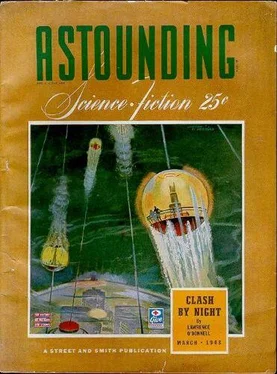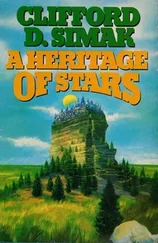Clifford Simak - Shadow Of Life
Здесь есть возможность читать онлайн «Clifford Simak - Shadow Of Life» весь текст электронной книги совершенно бесплатно (целиком полную версию без сокращений). В некоторых случаях можно слушать аудио, скачать через торрент в формате fb2 и присутствует краткое содержание. Год выпуска: 1943, Издательство: Street & Smith Publications, Inc., Жанр: Фантастика и фэнтези, на английском языке. Описание произведения, (предисловие) а так же отзывы посетителей доступны на портале библиотеки ЛибКат.
- Название:Shadow Of Life
- Автор:
- Издательство:Street & Smith Publications, Inc.
- Жанр:
- Год:1943
- ISBN:нет данных
- Рейтинг книги:5 / 5. Голосов: 1
-
Избранное:Добавить в избранное
- Отзывы:
-
Ваша оценка:
- 100
- 1
- 2
- 3
- 4
- 5
Shadow Of Life: краткое содержание, описание и аннотация
Предлагаем к чтению аннотацию, описание, краткое содержание или предисловие (зависит от того, что написал сам автор книги «Shadow Of Life»). Если вы не нашли необходимую информацию о книге — напишите в комментариях, мы постараемся отыскать её.
Shadow Of Life — читать онлайн бесплатно полную книгу (весь текст) целиком
Ниже представлен текст книги, разбитый по страницам. Система сохранения места последней прочитанной страницы, позволяет с удобством читать онлайн бесплатно книгу «Shadow Of Life», без необходимости каждый раз заново искать на чём Вы остановились. Поставьте закладку, и сможете в любой момент перейти на страницу, на которой закончили чтение.
Интервал:
Закладка:
He pressed his hand hard against the metal once again, just to be sure. It still was there, solid and substantial.
He turned back to look at the dead thing on the floor.
“I wish,” he said wistfully, “I’d found out what it was.”
Dr. Charles H. Carter knew he had done a good job. The book was a little dogmatic here and there, perhaps, a little anxious to prove his hypothesis — but after a man had dug and burrowed in the midden heaps of Mars for over twenty years he had a right to be a bit dogmatic.
He picked up the last page of the manuscript and read it over again:
There is, I am convinced, good reason to believe the Martian race may not be extinct, although where it is or why it went there is a question we cannot answer on the basis of our present knowledge.
Perhaps the strongest argument to be advanced in support of the contention the Martians still may be extant is that same situation which has held our knowledge of them to a minimum — the absolute lack of literature and records. Despite extensive search, nothing approaching a Martian library has been found.
That a people, regardless of the manner in which their extinction came about, either slowly and only through final defeat by a long-fought danger, or swiftly by some quickly-striking force, should be able or should wish to destroy or conceal all records seems unlikely. Even if the wish had been present, the exigencies of fighting for survival would have made it difficult of accomplishment. In any event, it would seem far more logical that a people, faced with extinction, would have made every effort to leave behind them some enduring record which might at least save their name from the annihilation which they themselves knew they were about to suffer. The better supposition, it would seem, is that the Martians went somewhere and took their records with them.
Nor do we find in the architecture or the art of Mars any hint of a situation which may have ended in the extinction of the race. That the Martians must have realized their planet was not equipped for the continued support of large populations is shown by many trends in art, particularly the symbolism of the water jug. But nowhere is there evidence of any violent, overshadowing danger. Martian art and architecture pursue, throughout their many periods, a natural development that reflects nothing more than the steady growth of a mature civilization.
It is regrettable more cannot be learned from that unique residuary personality, popularly called the Martian Ghost, still residing within the one Martian city which appears to be of comparatively recent date. In my contacts with the Ghost I have received the definite impression that he, if he wished, might provide the key we seek, that he might furnish definite information concerning the present whereabouts and condition of the Martian race. But in dealing with the Ghost one deals with a form of life which has no parallel in modern knowledge, with understanding further complicated by the fact that it is in substance the image of an alien mind.
Carter laid the page down on his desk, reached for his pipe.
The metallic thing that squatted in one corner of the study moved slightly.
“I take it, doctor, that your work is done,” it said.
Carter started, then settled back, tamped tobacco in his pipe.
“I’d almost forgotten about you, Buster,” he told the robot. “You sit so still.”
The man stared out of the window-port that framed the wild, red emptiness of Mars. Fine, weatherworn sand that whispered when one walked. Off to the left the fantastic towers of harder rock which had resisted the forces that had leveled down the planet. To the right the faintest hint of spires and turreted battlements — the Martian city where dwelt Elmer, the Martian Ghost. Nearer at hand the excavations where twenty years of digging and sifting and studying had netted a pitiful handful of facts about the Martian race — facts that lay within the pages of the manuscript piled on his desk.
“No, Buster,” he said, “my work isn’t done here. I’m only quitting it. Someone will come along some day and take up where I left off. Perhaps I should stay — but these have been lonely years. I’m running away from loneliness and I am afraid I won’t succeed. I’ve been on the verge of it many times before. But something kept me here — the knowledge it was not only my work I was doing, but someone else’s work as well.”
“Dr. Lathrop’s work,” rasped Buster’s thoughts.
Carter nodded.
Twenty years ago Steve Lathrop had dropped out of sight. Carter could remember perfectly the morning Steve had left for the little outpost of Red Rocks to get supplies. Each detail of that morning seemed etched into his consciousness. During those intervening years he had lived it over and over again, almost minute by minute, trying to unearth even the tiniest incident that might be a clue. But there had never been a clue. Stephen Lathrop, to all intent and purpose, simply had walked off the face of Mars, vanished without a trace. He had left to get supplies; he had never returned. That, in itself, was the beginning and the end. That was all there was.
Soon he would have to start packing, Carter knew. The manuscript was finished. His notes were all in order. All but a few of the specimens were labeled, ready for packing. The laborers had been discharged. As soon as Alf came back, they would have to get to work. Alf had gone to town three days before and hadn’t returned — but that was nothing unusual. Somehow, Carter could feel no irritation toward Alf. After all, an occasion such as this, the end of twenty years of labor, called for a spree of some sort.
The last rays of the setting sun streamed into the window and splashed across the room, lighting up and bringing out the color of the collection of Martian water jugs ranged along the wall. Not a very extensive collection when measured against some of those gathered by professional collectors, but a collection that brought warmth into Carter’s soul. Those jugs, in a way, represented the advance of Martian culture, starting with the little lopsided jug over on the left up to the massive symbolic piece of art that marked the peak of the jug cult’s development. Jugs from every part of Mars, brought to him by the scrawny, bewhiskered old jug hunters who ranged the deserts in their everlasting search, always hopeful, always confident, always dreaming of the day when they would find the jug that would make them rich.
“Elmer has a guest,” said Buster. “Maybe I should be getting back home. Elmer might need me.”
“A guest, eh,” said Carter, mildly surprised. Elmer had few visitors. At one time the city of the Martian Ghost had been on the itinerary of every tourist, but of late the government had been clamping down. Visitors upset Elmer and inasmuch as Elmer held what amounted to diplomatic status, there was little else the government could do. Occasionally scientists dropped in on Elmer or art students were allowed to spend a short time studying the paintings in the city — the only extensive list of Martian canvases in existence.
“A painter,” said Buster. “A painter with pink whiskers. He has a scholarship from one of the academies out on Earth. His name is Harper. He’s especially interested in ‘The Watchers.’”
Carter knew about “The Watchers,” a disturbing, macabre canvas. There was something about its technique that almost turned it alive — as if the artist had mixed his pigments with living fear and horror.
The radiophone on the desk burred softly, almost apologetically. Carter thumbed a tumbler and the ground glass lighted up, revealing a leathery face decorated by a yellow, walruslike mustache, outsize ears and a pair of faded blue eyes.
“Hello, Alf,” said Carter genially. “Where are you? Expected you back several days ago.”
Читать дальшеИнтервал:
Закладка:
Похожие книги на «Shadow Of Life»
Представляем Вашему вниманию похожие книги на «Shadow Of Life» списком для выбора. Мы отобрали схожую по названию и смыслу литературу в надежде предоставить читателям больше вариантов отыскать новые, интересные, ещё непрочитанные произведения.
Обсуждение, отзывы о книге «Shadow Of Life» и просто собственные мнения читателей. Оставьте ваши комментарии, напишите, что Вы думаете о произведении, его смысле или главных героях. Укажите что конкретно понравилось, а что нет, и почему Вы так считаете.











